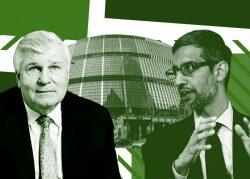Who will be brave enough to make the next break from the herd and invest in a big Chicago office?
It’s been over a year since a major office property changed hands in the Loop area, one of the last being Google’s $105 million purchase of the James R. Thompson Center on July 28, 2022, CoStar reported.
Two other sales occurred on that same day, both made by a venture of Prime Group and Capri Interests that played a role in landing Google in the Loop. The firms bought neighboring towers at 111 West Monroe Street and 115 South LaSalle Street for about $118 million.
Now, it’s been 12-plus months since an office transaction of $50 million or higher in the city, marking the longest drought since the Great Recession of 2008. Some people thought the flurry of sales that day was a sign of a recovering office market, but it turned out to be an anomaly instead.
Chicago’s office vacancy rate soared to a record high of nearly 23 percent last quarter, and the amount of available sublease space rose to 8 million square feet. The remote-work era continues to linger, which has led to massive company layoffs and downsizings. Plus, a tight lending climate and hiked interest rates have made it tougher for landlords to refinance their holdings.
The office sector’s years of issues since the pandemic began have mounted into financial distress. A number of landlords have been forced to sell their properties at a steep discount, surrender their assets via deed-in-lieu or face foreclosure suits.
With hardly any recent sales to compare to, brokers in Chicago have had to analyze other markets, like Minneapolis, to attain measurables. And as lenders hesitate to provide financing for office deals, more prospective buyers are having to rely on private capital, usually stemming from ultra-wealthy individuals or firms.
Read more


In June, R2 Companies was under contract to pay about $70 million for the 41-story tower at 150 North Michigan Avenue. If that deal gets finalized around that price, the drought would be over, though once again at a steep loss for the seller of the property, a venture of CBRE’s investment arm.
Still, some dealmakers are sensing that the worst days could soon be in the rearview.
“It does feel like things are starting to loosen,” Cushman & Wakefield broker Cody Hundertmark told the outlet. “Anytime you need to re-calibrate so significantly in a short period of time, it’s going to lead to a pause. Everything has changed in the past year-plus. But I’m a firm believer that transactions breed other transactions.”
— Quinn Donoghue
